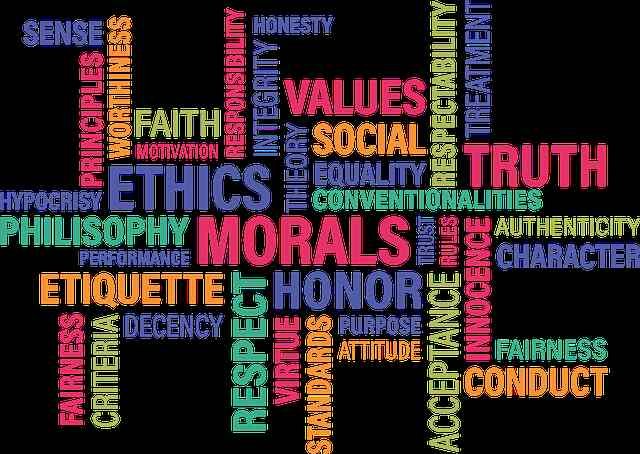Understanding Business Ethics: Defining Principles and Real-World Applications
Business ethics is like a rulebook for how companies should behave. It helps them decide what’s good or bad in how they do things. Nowadays, lots of people are talking about it and trying to do better. It’s all about being fair and doing the right thing, especially in how we treat others. So, it’s like a special part of how we think about what’s right and wrong.
When it comes to figuring out what’s acceptable or not, we ask questions like: What does “acceptable” mean? What are the basic rules for what’s okay? Who gets to decide?
But sometimes, these questions don’t have clear answers. Ethics can be a bit of a debate.
This idea of business ethics started in the United States, around the early 1900s. Some folks didn’t want to invest in companies that made stuff they thought was harmful, like alcohol or tobacco.
In a nutshell, business ethics is about not sacrificing important values just to make money. It’s a way of thinking that says profits shouldn’t come at the expense of what really matters.
Why Do We Need Business Ethics?
Business ethics have some important goals:
- Taking Care of the Environment: This means making sure our activities don’t harm nature. Most companies are trying hard to be kind to the environment. They’re changing how they make things and taking responsibility for their impact.
- Playing Fair: Even though businesses compete, it’s not okay to play dirty. Business ethics say we should compete in a fair and honest way. Companies that don’t play fair get noticed for the wrong reasons.
- Good Quality Stuff: When we buy things, we want them to be good, right? Business ethics make sure companies don’t make and sell bad-quality stuff. They have to meet certain standards so we get what we expect.
- No Tricky Advertising: Have you ever seen ads that make things sound amazing, but when you try them, they’re not? That’s not right. Business ethics say that companies shouldn’t use ads that trick people.
- Happy Workplaces: We all want to work in a place where we feel good, right? Business ethics make sure companies create a positive and respectful environment for their employees. This helps everyone do their best.
How Managers Keep Bad News Under Wraps: Unraveling the Tactics and Solutions
How to Make Ethics a Part of Your Company?
In our society, we’re paying more attention to doing things right, like taking care of the environment, treating people fairly, and being cautious about technology. This is what we call ethical concern. And it’s been getting more important lately.
So, it’s a good idea to bring ethical thinking into companies. A manager who cares about ethics should be brave, trustworthy, open, and most importantly, kind. They should be able to lead projects and teams while keeping their values in mind.
Ethics helps deal with business challenges like pressure to make sales, conflicts of interest, or unfair practices. It lets you make decisions that match your beliefs.
In real terms, this means setting up things like ethics committees, alert systems, or ethical guidelines:
- Ethics Committee: This is like a group of people in a company who think about and discuss the ethical questions related to the work they do. They might look at real cases, help health professionals make decisions, and more.
- Professional Whistleblowing: This is when an employee or someone connected to a company speaks up about things that are going wrong. It’s a way to report problems that are harming the company or others. Companies organize this through a system called a professional alert system.
- Ethics Charter: This is like a rulebook that lays out the good behavior and principles everyone in the company should follow. It also explains how the company will make sure these rules are followed by its employees and partners.
Even small companies should think about ethics. It’s a good move, and it might even be required by a business partner or investor in the future!
Crafting a Comprehensive Business Plan: Key Elements and Best Practices
Business Ethics – Explanation and Examples (Manners in Business)
Business ethics is the compass that guides companies towards doing what’s morally right and just in the world of commerce. It’s akin to possessing good manners in the business realm. Let’s delve deeper into what this entails, accompanied by real-life instances to provide a clearer understanding.
1. Honesty and Truthfulness
Imagine a company that promotes a product with exaggerated claims or false information. This isn’t honest conduct. True honesty entails forthrightly representing a product, even if it entails conveying tough truths.
Check all your printed stuff, like ads, website and brochures, to make sure they’re clear, correct, and look professional. The key is to ensure they don’t give the wrong idea or information.
For instance: A tech company should accurately represent the capabilities of its software, steering clear of embellishments or false promises.
2. Fair Treatment
In an ethically-run business, every customer, regardless of their scale, should receive equitable treatment. It’s unjust to grant preferential treatment to certain clients while neglecting others.
- Be Confident: Understand that customers prefer to deal with a trustworthy company; it’s something that’s easily sensed. Trust means having strong belief in the honesty, capability, integrity, and truthfulness of a business.
- Stay Open-Minded: To keep a company improving, a leader must be willing to consider new ideas. Seek input and suggestions from customers and your team, and your business will keep moving forward.
For instance: A hotel should provide the same level of hospitality to all guests, irrespective of the room they’ve booked.
3. Respecting Others
In any professional setting, ensuring that everyone has the opportunity to voice their opinions and ideas is paramount. Disrupting or disregarding another’s input is a breach of ethical conduct.
Always keep your promises. No matter what happens, do your best to regain the trust of past customers, especially if something went wrong. Make things right and fulfill all your commitments and responsibilities.
For instance: During a team meeting, every member should have the opportunity to share their thoughts without interruption or dismissal.
4. Taking Responsibility
When a company makes a misstep, ethical behavior mandates that they acknowledge it and take corrective action. It’s unjust to shift blame onto others or attempt to conceal the issue.
For instance: If a software company releases a faulty update, they should admit the error and work to rectify it, rather than pointing fingers elsewhere.
5. Protecting the Environment
An ethically-conscious company refrains from actions that harm the environment or contribute to pollution. They should actively seek ways to be environmentally responsible, such as implementing recycling practices.
For instance: A manufacturing company should invest in eco-friendly production processes to minimize their environmental impact.
6. Not Cheating or Stealing
Respecting intellectual property is a cornerstone of ethical business conduct. Replicating someone else’s work or ideas without due credit is akin to theft.
For instance: A design agency should never copy another artist’s work and present it as their own.
Zero Base Budgeting (ZBB) | Definition, features and benefits
7. Being Transparent
Concealing important information from customers is a breach of transparency. An ethical business is forthright and open about all aspects of its operations.
Keep a close eye on your finances and keep detailed records. This helps you understand how your business is doing and lets you catch any suspicious activity. Being in charge of your accounting lets you stop any questionable actions quickly.
For instance: A financial institution should clearly communicate all terms and conditions to its clients without any hidden clauses.
8. Giving Back to the Community
Many companies find it imperative to contribute to their local community, either through financial donations or volunteer work. This serves as a testament to their ethical commitment and a way of giving back.
Businesses are like big teams, and they have a duty to look out for everyone involved. This includes the workers, the people who own a part of the company, and the customers. When everyone is taken care of, the business can really thrive and do well.
For instance: A successful corporation might donate a portion of their profits to local charities or sponsor community events.
Reimagining Business and Nature: A Path Towards Regeneration and Prosperity
In conclusion, business ethics is akin to a guiding framework for moral conduct in the corporate world. It extends beyond mere profit-making, emphasizing fairness, honesty, and responsibility. Companies that adhere to strong ethical principles cultivate trust among their clientele and communities, paving the way for sustained success.
Sources: PinterPandai, Time Doctor, Investopedia, Indeed, Harvard Business School
Photo credit: 905513 via Pixabay
The Evolving Landscape of Moral Change: Exploring Examples of Ethical Evolution



